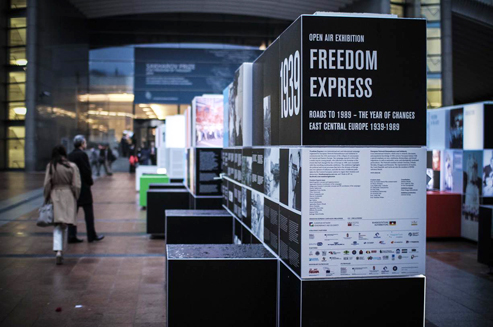The exhibition, which is on display at the Esplanade Solidarnosc 1980, documents the process through which Central and Eastern Europe regained its freedom from communist dictatorship. It also shows various ways in which civil liberties were limited in the former communist bloc, as well as attempts to regain them. It focuses especially on the question of what connects and divides remembrance of the events that preceded the fall of communism in Central and Eastern European societies.
“Our aim is first and foremost to remind everyone of the processes that eventually led to the fall of communism in this part of Europe,” explains Professor Jan Rydel, chairman of the Steering Committee of the European Network Remembrance and Solidarity, the Freedom Express campaign’s initiator.
The exhibition also presents different faces of freedom, including freedom of speech and expression, freedom of religion and belief, and economic freedom.
“The geometrical setup of the pieces will make them fit perfectly with the landscape of city squares and arteries. It will create a zone within the city space designed for meeting the history. Archival photographs and texts are placed on illuminated cubes so the audience can view the exhibition also at night’The geometrical setup of the pieces will make them fit perfectly with the landscape of city squares and arteries. It will create a zone within the city space designed for meeting the history. Archival photographs and texts are placed on illuminated cubes so the audience can view the exhibition also at night,” says Mirosław Nizio, author of the exhibition’s architectural design.
The inauguration ceremony, which took place in Brussels on 18 November, was attended by President of the European Parliament Martin Schulz, as well as ambassadors to the Kingdom of Belgium of Poland, Germany, the Czech Republic, Slovakia, Hungary, Lithuania, Latvia, Estonia, Bulgaria and Romania.
Before arriving in Brussels, the exhibition was presented in Berlin, while from 28 November to 15 December, it will be on display in Warsaw. It is also available on-line.
The event is organised under the Freedom Express campaign, launched by the European Network Remembrance and Solidarity in cooperation with the culture ministries of Poland, Germany, Hungary and Slovakia.
Apart from the exhibition, the campaign included a study trip, during which a group of young artists, journalists and historians travelled from Gdansk to Berlin, stopping over in Warsaw, Budapest, Timisoara, Sopron, Bratislava, and Prague. The trip’s programme, which included meetings, workshops and artistic activities, was organised by a score of institutions active in the area of 20th century history.
Photo © MFA
Source: Press Office of the Ministry of Foreign Affairs Republic of Poland


